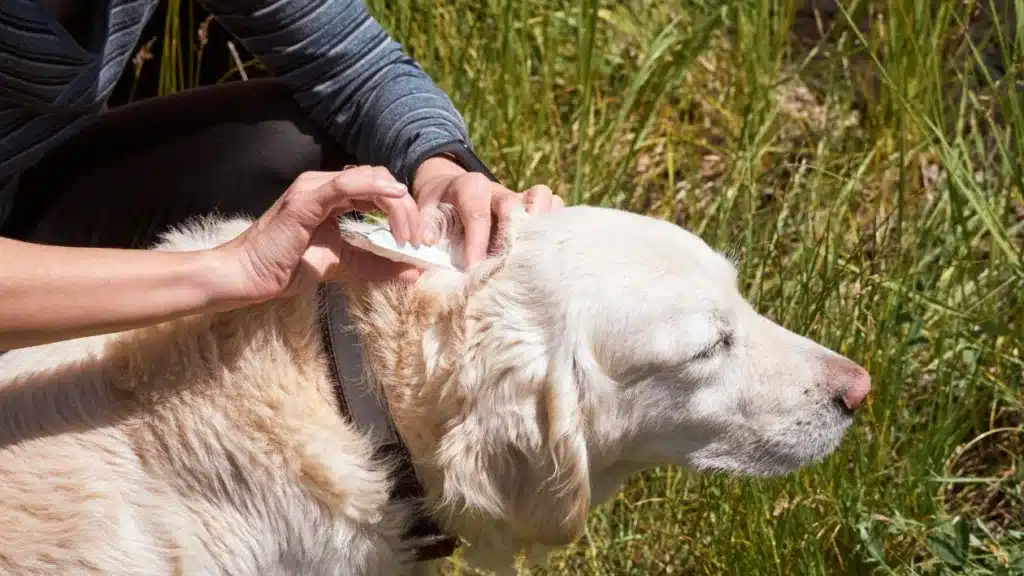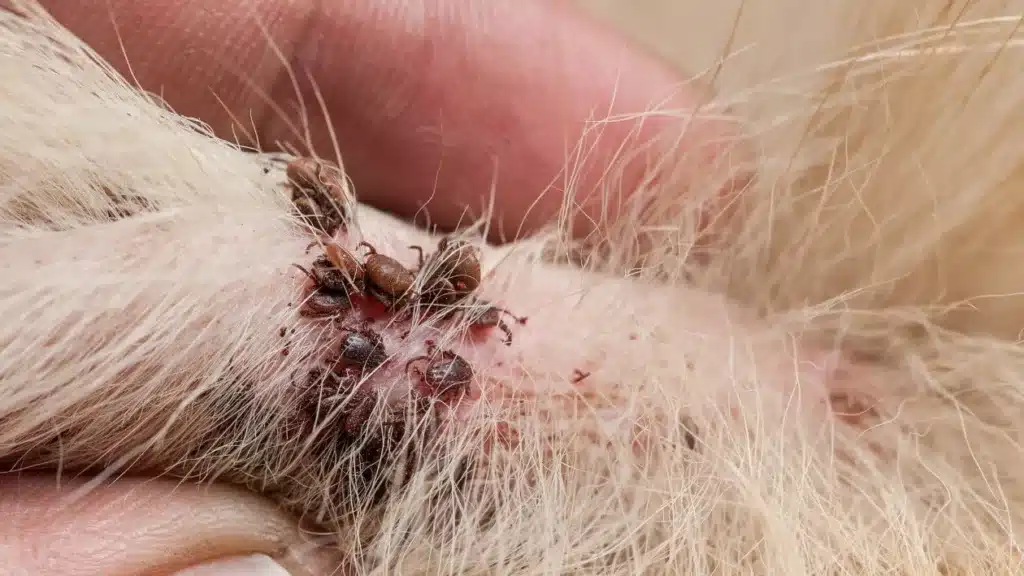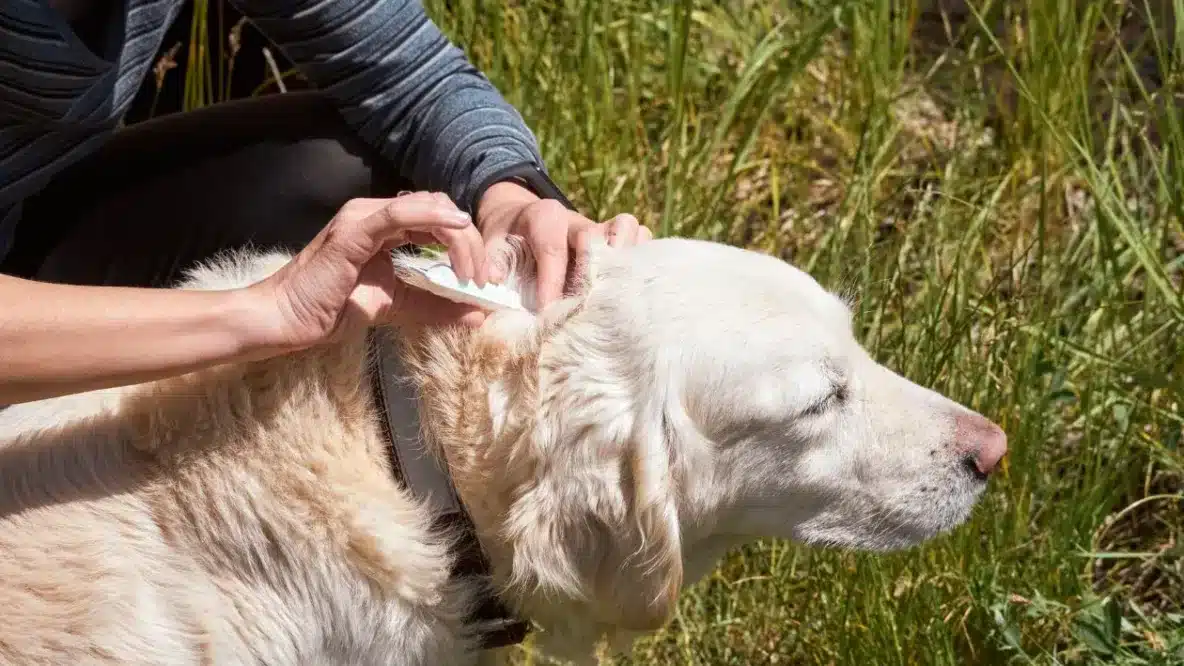
Time To Think Your Summer Parasite Prevention Plan
Summer is a time for outdoor adventures with your dog, but it also brings an increased risk of fleas ticks and other parasites. These pests can cause a range of health issues for your furry friend, from mild irritation to serious diseases. It’s crucial to implement a comprehensive parasite control and prevention plan to keep your dog safe and healthy during the warmer months.
One underrated method to summer parasite prevention and detection is regular grooming sessions. Regular grooming not only keeps your dog clean and comfortable but also allows you to check for signs of parasites like fleas, ticks, and mites early on. By incorporating grooming into your routine, you can catch infestations before they become severe, ensuring your dog’s continued health and happiness.
Fleas
Fleas are tiny, wingless insects that feed on the blood of animals. They thrive in warm, humid environments, making summer a peak time for infestations. Fleas can cause itching, allergic reactions, and transmit tapeworms and other diseases.
Symptoms: Scratching, biting at the skin, hair loss, red or irritated skin, flea dirt (small black specks) in the fur.
Risks: Fleas can cause severe itching and allergic reactions. In severe cases, they can lead to anemia due to blood loss. Fleas also transmit tapeworms and other parasites.
Prevention and Treatment
- Topical Treatments: Monthly spot-on treatments applied to the back of the neck, such as Frontline, Advantage, and Revolution.
- Oral Medications: Monthly chewable tablets like NexGard, Bravecto, and Simparica.
- Flea Collars: Long-lasting collars like Seresto that provide up to 8 months of protection.
- Environmental Control: Regularly clean your dog’s bedding and vacuum your home to reduce flea eggs and larvae.

Ticks
Ticks are parasitic arachnids that attach to animals and humans to feed on their blood. They are commonly found in wooded and grassy areas. Ticks can transmit serious diseases such as Lyme disease, Rocky Mountain spotted fever, and ehrlichiosis.
Symptoms: Visible ticks on the skin, itching, redness or swelling at the bite site, fever, lethargy, joint pain.
Risks: Ticks can transmit a variety of serious and potentially fatal diseases. Early detection and removal are crucial to prevent infection.
Prevention and Treatment
- Topical Treatments: Products like Frontline Plus and Advantix II.
- Oral Medications: Chewable tablets like NexGard, Bravecto, and Simparica.
- Tick Collars: Long-lasting options like Seresto.
- Tick Checks: Regularly check your dog for ticks, especially after outdoor activities. Remove any ticks promptly using tweezers or a tick removal tool.
- Environmental Control: Keep your yard well-maintained by mowing grass and removing leaf litter to reduce tick habitats.
Mosquitoes
Mosquitoes are flying insects that feed on blood. They are prevalent in summer and can transmit heartworm disease, a serious and potentially fatal condition.
Symptoms: Itching and irritation at the bite site. Heartworm symptoms include coughing, fatigue, weight loss, and difficulty breathing.
Risks: Mosquitoes are the primary vector for heartworm disease, which can cause severe damage to the heart and lungs if left untreated.
Prevention and Treatment
- Heartworm Preventatives: Monthly oral tablets (Heartgard, Interceptor) or topical treatments (Revolution).
- Mosquito Repellents: Use repellents that are safe for dogs, such as sprays or wipes.
- Environmental Control: Reduce standing water around your home to minimize mosquito breeding sites. Avoid walks during peak mosquito activity times (dawn and dusk).
Flies
Flies, including biting flies and botflies, can cause various issues for dogs. They can lead to painful bites and, in some cases, lay eggs that develop into larvae under the skin.
Symptoms: Red, swollen bite marks, itching, irritation, presence of larvae under the skin in severe cases.
Risks: Fly bites can cause discomfort and irritation. Botfly larvae, also known as warbles, can cause infection if they burrow under the skin.
Prevention and Treatment
- Fly Repellents: Use products specifically designed for dogs, such as sprays or ointments.
- Environmental Control: Keep your dog’s living area clean to reduce fly attraction. Use fans or fly traps to minimize fly presence.
- Wound Care: Keep any wounds clean and covered to prevent fly attraction and potential infestation.
Mites
Mites are tiny parasites that can cause skin irritation and mange, a skin condition resulting in hair loss and sores. Common types include ear mites, sarcoptic mites, and demodex mites.
Symptoms: Intense itching, red or irritated skin, hair loss, scabs, ear discharge (for ear mites).
Risks: Mites can cause severe skin infections and mange. Some types of mange, such as sarcoptic mange, are highly contagious to other animals and humans.
Prevention and Treatment
- Topical Treatments: Medications such as Revolution or Advantage Multi.
- Oral Medications: Ivermectin or Bravecto can be prescribed for certain types of mites.
- Regular Grooming: Regular brushing and bathing can help detect and prevent mite infestations.
- Ear Cleaning: Use vet-recommended ear cleaners to prevent and treat ear mites.

Worms
Worms, including roundworms, hookworms, whipworms, and tapeworms, are internal parasites that can cause a variety of health issues in dogs. They are often transmitted through ingestion of contaminated soil, water, or feces.
Symptoms: Diarrhea, vomiting, weight loss, bloated abdomen, lethargy, visible worms in stool.
Risks: Worm infestations can lead to malnutrition, intestinal blockages, and anemia. Some worms are zoonotic, meaning they can be transmitted to humans.
Prevention and Treatment
- Oral Medications: Regular deworming treatments such as Drontal, Panacur, or Interceptor.
- Topical Treatments: Some topical products, like Revolution, also protect against certain types of worms.
- Environmental Control: Clean up after your dog to prevent contamination, avoid letting your dog drink from stagnant water sources, and ensure regular veterinary check-ups for fecal testing.
Preventing parasites during the summer is essential for keeping your dog healthy and comfortable. Regular use of preventative treatments, combined with vigilant checking and grooming, can protect your pet from the discomfort and serious health risks associated with parasites. Always consult your veterinarian to determine the best summer parasite prevention plan for your dog based on their specific needs and lifestyle.

